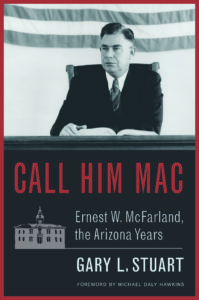
As the mother of a U.S. Marine and as someone from a family with a long history of military service, Veterans Day isn’t merely an occasion for furniture or appliance shopping.
November 11 conjures memories of a visit to Arlington National Cemetery and Veterans Day parades, of long talks with a neighbor who survived combat in WWII.
On that day, my heart will also be in Quantico, Virginia, where my son and his comrades are undergoing incredibly rigorous training. I’ll think also of my nephew, an Army Ranger who now, thanks to the G.I. Bill, is studying at Columbia University in New York.
As a lover of books, I’m planning on treating myself to Call Him Mac: Ernest W. McFarland, the Arizona Years, a new tome chronicling the life of McFarland, father of the G.I. Bill.
For West Chandler resident John D. Lewis, grandson of McFarland, the new book is sure to evoke some unforgettable memories of his own, particularly the lessons he learned at his grandfather’s side.
Lewis was 7 years old when the former U.S. Senator, judge and governor of Arizona taught him about honesty. The two were in a hospital waiting room where Lewis said he shook
a newspaper rack and hit the jackpot. A large pile of quarters rattled out.
“I scooped them all up and went to show my grandfather the great find and treasure that I got out of that newspaper machine. And he said, ‘Let me see those.’”
Lewis followed his grandfather back to the machine and watched as the older man — an elder statesman and distinguished judge—fed all the quarters back into it, clicking to make sure they landed in the coin box.
“He didn’t say a word, didn’t scold me, didn’t do anything, just ‘that was what we do.’ And that was it,” Lewis recalled.
McFarland, a senior statesman who rose from humble beginnings as a farmer, came to Arizona with $10 on his pocket after a bronchial infection ended his naval career. He saw how returning veterans of WWI came home to rampant unemployment, with former soldiers standing in long unemployment and soup kitchen lines.
McFarland eventually launched a career in politics, serving in the U.S. Senate during 1941-1953. He was later elected governor of Arizona and subsequently served as Chief Justice of the Arizona Supreme Court.
 Call Him Mac: Ernest W. McFarland, the Arizona Years, written by Gary L. Stuart and published by U of A Press, renders a nuanced portrait of a young, ambitious, restless, and smiling man on the verge of becoming a political force on his way to the highest levels of governance in Arizona and America.
Call Him Mac: Ernest W. McFarland, the Arizona Years, written by Gary L. Stuart and published by U of A Press, renders a nuanced portrait of a young, ambitious, restless, and smiling man on the verge of becoming a political force on his way to the highest levels of governance in Arizona and America.
Stuart reveals how McFarland became an expert on water law and a visionary in Arizona’s agricultural future. Using interviews with friends and family and extensive primary source research, Stuart spotlights McFarland’s focus as a loving husband, father and grandfather, even in times of great personal tragedy.
His enormous political successes, Stuart posits, were answers to how he dealt with threats to his own life in 1919, the loss of his first wife and three children in the 1930s, and a political loss in 1952 that no one saw coming.
Lewis remembers McFarland as the grandfather who emphasized the importance of education and urged him to “do the right thing” and to obey the law.
As a senator, McFarland sought to avoid a repeat of an infamous incident at Anacostia Flats, when 43,000 marchers comprising WW I veterans and families went to Washington to demand cash-payment redemption of their service certificates that had been awarded in 1924.
Most of the vets had been unemployed since returning after service. The June 1932 gathering led to a clash with police, and two veterans were shot and killed in the confrontation.
McFarland drafted the portions of the GI Bill that gave veterans access to education through tuition assistance, zero-down home loans and low interest business loans.
The resulting bill allowed millions of WWII veterans to come back to a land of opportunity, where higher education, home ownership and business loans were not just entitlements for the privileged, but realistic goals for the common man.
McFarland passed away in 1984 and is also remembered as the president
of the Arizona Television Company who, shortly after becoming governor of Arizona in 1955, opened KTVK, the state’s third television station.
The Ernest McFarland Memorial, located at Wesley Bolin Plaza, features a 24-foot triumphal arch meant to symbolize the gateway to opportunity for all Americans.
Vincent Murray, a historian with Arizona Historical Research, spoke to the theme of the monument as it relates to McFarland’s legacy.
“The GI bill helped millions of people achieve the American dream,” Murray said.
“The American Dream isn’t about owning a house or a car or anything like that.
Decades later, finally home from war zones around the globe, people like my nephew are now setting out to achieve that American dream.
Thanks, Mac.


